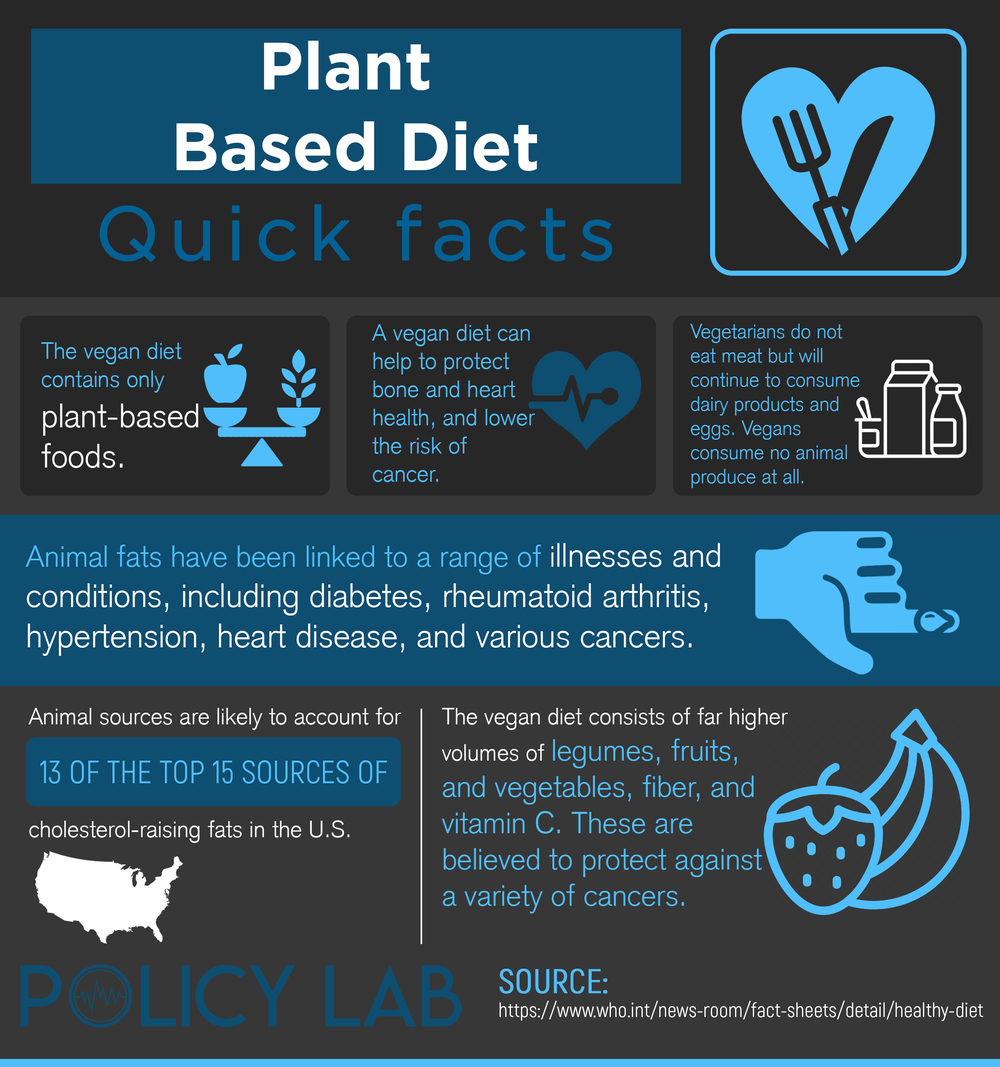Match to Plant Based Diet Clinical Trials
Aplant-based diet is a diet that focuses on foods derived from anything that grows in the soil, including fruits, vegetables, seeds, nuts, grains, etc. Some individuals who decide to eat a plant-based diet also decide to eliminate meats and other animal products from their diets, while some only decide to continue eating animal products but limit their consumption. There is not a set of rules that defines how eating a plant based diet looks like, so a plant based diet can vary greatly from person to person.
Generally speaking, people who follow a plant-based diet, whether they eat animal products or not, get most of their nutrients from plants, nuts, seeds, and grains. Those who don’t eat any kind of animal protein but still incorporate fish, eggs or dairy into their diets are called vegetarians, whereas people who decide to eliminate all products derived from animals are called vegans.
Plant based diets have been associated with a reduced risk in heart disease, a lower body mass index (BMI), lower cholesterol, and a reduced incidence of some chronic conditions including type 2 diabetes. Research studies have also shown that individuals who eat more fruits and vegetables have lower cholesterol levels compared to those who eat more meat.
While there is a general consensus in the medical community of the benefits a diet that mostly relies on fruits and vegetable brings, doctors are still in quite a bit of disagreement regarding how the ideal diet should look like. There are some that claim that reducing the amount of meats and increasing the consumption of fruits and vegetable is enough for improving health, whileothers claim that meats and dairy should be completely eliminated.
Because plant based are becoming increasingly popular among the general population, and there are many instances in the medical literature where diets high in fruits and vegetables and low in meat have been shown to lower the risk for certain diseases and increase quality of life, plant based diet clinical trials have been emerging aiming to test these claim against clinical indicators.

What Are Clinical Trials?
A clinical trial is a medical research study that often involves human beings. The purpose of a clinical trial is to test the safety and effectiveness of an intervention in people. The intervention on a clinical trial can refer to a new drug or medication, a medical device, a screening or diagnostic test, or even a behavioral or lifestyle intervention.
Clinical trials are comprised of four phases or stages that start with a small number of participant and progresses to large number of volunteers to test the intervention before it is made available to the public. The first phase (phase I) tests the experimental treatment or intervention in a small group of healthy volunteers; at this stage, researchers fine-tune the correct dosage and test for any potential side effects.
Phases II and III test the intervention in a bigger group of volunteers, and on this stages the new group of participants may include people who have a specific illness to test how it reacts to the intervention. At the fourth and final phase, if the intervention is a drug or medical device, the FDA has approved it and it continues to be monitored to account for any potential side effects that didn’t come up during the trials.
Some plant based clinical trials don’t test any medications or devices, but the purpose is to determine whether following a certain diet can have an impact on a person’s health or specific condition. To do this, researchers usually divide the volunteers into random groups and give them different diets. Then, participants have different tests done to assess if the indented diet has caused any changes or improved their condition.
Clinical trials are very carefully designed by medical experts to ensure all research is conducted in an ethical manner. Before a trial starts, the research team must submit a protocol outlining every step of the research process to the FDA and other regulatory agencies that will determine if the study is necessary, ethical, and feasible.
How Can I Sign Up For A Clinical Trial?
Participating in a clinical trial is a very personal choice, and many people do it because they want to help science move forward and find new treatments and medications that can potentially save the lives of many down the line.
Every year, there are thousands of clinical trials going on all over the country and many of them need volunteers that are willing to offer their time. Some times clinical trials will actively recruit participants through ads in the radio or television, but your doctor or healthcare provider can also point you in the right direction if you are looking for a clinical trial but don’t know where to start.
Plant Based Diet Clinical Trials for 2023
Match to Plant Based Diet Clinical Trials
Sources
- Harvard Health Publishing. (n.d.). The right plant-based diet for you. Retrieved from https://www.health.harvard.edu/staying-healthy/the-right-plant-based-diet-for-you